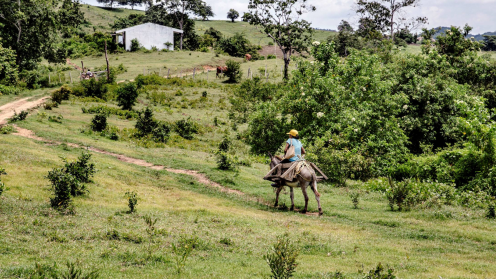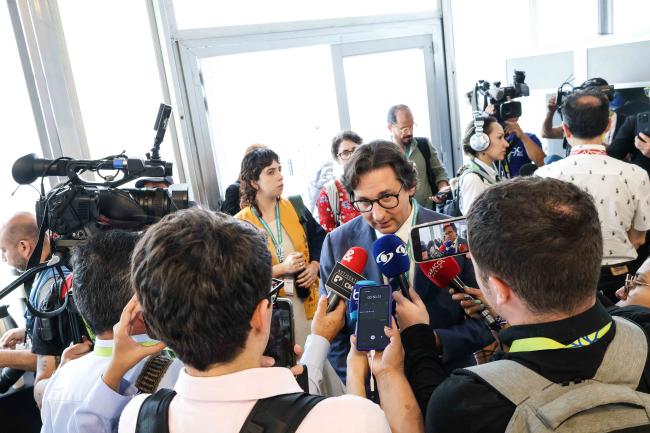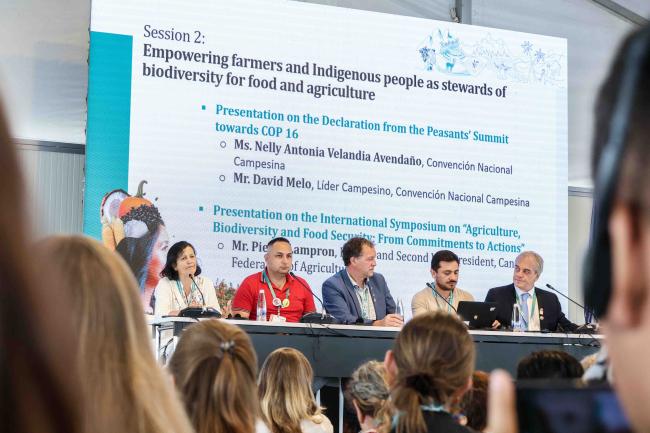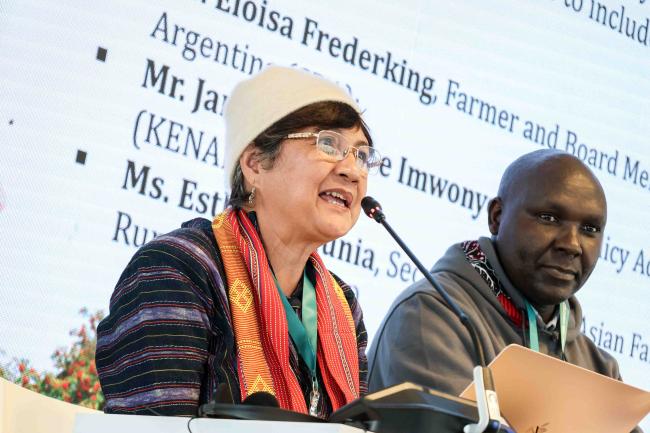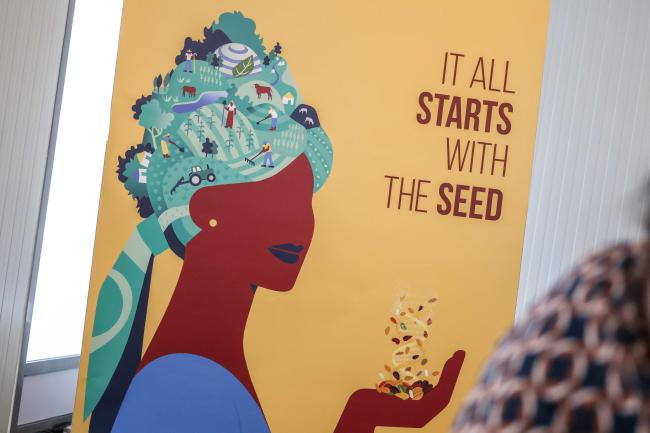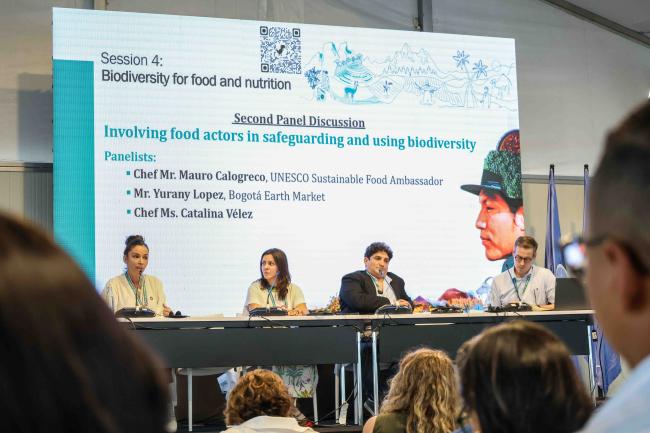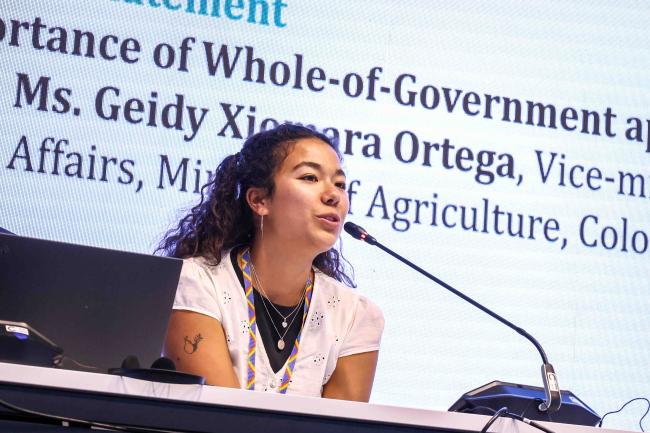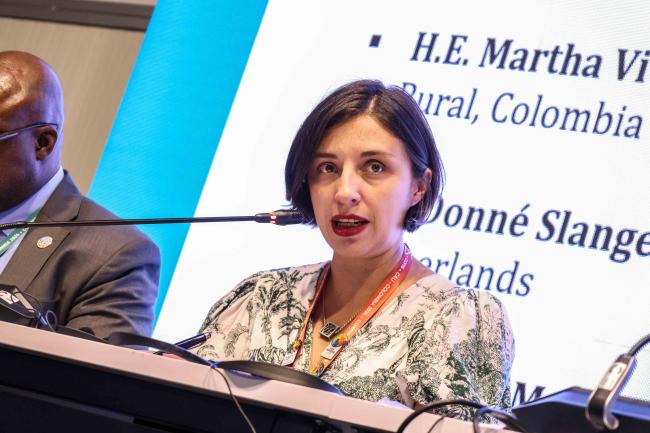About
The food-biodiversity-agriculture nexus is often overlooked, despite biodiversity serving as the foundation of food security and nutrition. Sustainable food and agriculture (agrifood) systems are essential for the implementation of the Kunming-Montreal Global Biodiversity Framework (GBF). This event explored mainstreaming food security and biodiversity considerations across all levels of participation—from farmers and communities to national, regional and global platforms.
Kaveh Zahedi, Director, Office of Climate Change, Biodiversity and Environment, Food and Agriculture Organization of the UN (FAO), welcomed attendees to Food Day, an opportunity for stakeholders to come together to discuss issues related to food security, nutrition, and peace with nature.
Agriculture Systems Transformation for Peace With Nature
In his opening statement, Juan Fernando Cristo, Minister of the Interior, Colombia, shared that hunger, self-sufficiency around food, and access to food security are some of the relevant issues in his country. He said that due to war and armed conflict, challenges to food security are prevalent, and efforts towards food security also relate directly to peace security.
Martha Viviana Carvajalino Villegas, Minister of Agriculture and Rural Development, Colombia, underscored sustainability and poverty as two main challenges surrounding agriculture. She also acknowledged the work of Indigenous Peoples and local communities (IPLCs) for the ecosystem and food systems.
Godfrey Magwenzi, Director of Cabinet, FAO, said biodiversity is the cornerstone of our agrifood systems. He noted Colombia’s recent ratification of the International Treaty on Plant Genetic Resources for Food and Agriculture (ITPGRFA), and commended Colombia’s significant efforts to follow a whole-of-government approach. He reminded attendees that we must strive for zero hunger, improved food security, and peace with nature.
Andrés Camacho Morales, Minister of Mines and Energy, Colombia, shared that his country is working on different solutions so that farmers have workable and competitive possibilities to help them advance and produce food in a more sustainable manner.
Juan David Correa, Minister of Culture, Arts, and Knowledges, Colombia, underscored the importance of culture noting that people inhabit different kinds of territories in his country such as desert and coastal areas. He highlighted the importance having cultural dialogues around efforts to achieve food security.
Astrid Schomaker, Executive Secretary, Convention on Biological Diversity (CBD), underscored the need to include bold and unambiguous agricultural targets in National Biodiversity Strategies and Action Plans (NBSAPs), and that agriculture must be part of how we move forward toward GBF goals. She said transformational change requires a systems perspective, not merely addressing farmers and agriculture. She expressed hope that Food Day would bring not only food for thought, but also an appetite for action.
Empowering Farmers and Indigenous People as Stewards of Biodiversity for Food and Agriculture
The session highlighted the urgent need for agrifood systems transformation to address biodiversity loss and promote socio-environmental justice.
Moderator Jean Lemire, Québec Ministry of International Relations and La Francophonie, said this is the COP of implementation.
Jose Luis Quiroga, Ministry of Agriculture, Colombia, noted the increased recognition of the role of campesinos as knowledge holders of traditional food systems that can contribute to GBF implementation. He highlighted Colombia’s efforts in bringing together farmers, campesinos, and IPLCs in the Peasant’s Summit, to discuss the scope of their contributions to biodiversity and sustainable use in advance of COP 16 negotiations.
Pierre Lampron, Canadian Federation of Agriculture, emphasized farmers as vital stewards of land and biodiversity, and crucial for conservation and food security. He noted that, even though two-thirds of GBF targets relate to agriculture, farmers are often excluded from discussions. He lauded the recent International Symposium, “Agriculture, Biodiversity and Food Security,” and the resulting Technical Roadmap that recognizes farmers’ contributions.
David Melo, Convención Nacional Campesina, highlighted campesinos as key stakeholders in biodiversity conservation, noting campesinos hold ancestral knowledge of sustainable production of clean, healthy food that nourishes the world while caring for biodiversity.
Nelly Antonia Velandia Avendaño, Convención Nacional Campesina, outlined key elements for equitable campesino participation in decision making: protecting rights-holders from violence and land conflicts; strengthening communal organizations; respecting traditional knowledge; broadening government participation; and increasing access to direct funding, land, and markets. She emphasized campesinos’ commitment to clean, sustainable food systems and highlighted women’s leadership in transformational change.
The first panel discussed local perspectives on CBD processes and GBF implementation.
Joji Cariño, International Indigenous Forum on Biodiversity (IIFB) and Forest Peoples Programme, described IIFB’s work on Article 8(j) and supported the creation of a permanent subsidiary body for Indigenous Peoples at the CBD. Cariño stressed the need to challenge industrial food chains that marginalize traditional knowledge. She lauded the development of the Indigenous Peoples Biodiversity Strategy and Action Plans in the Philippines.
Karen Post Bache, Danish Agriculture and Food Council, said farmers are a crucial part of transformative land use change. She underscored the need to empower and engage farmers on the ground and finance development of sustainable agriculture.
The second panel showcased national examples focusing on integrating biodiversity in agriculture and collaboration with governments on NBSAPs.
Eloisa Frederking, World Farmers’ Organization (WFO) and Sociedad Rural Argentina, shared examples from public-private programmes in Argentina that integrate biodiversity conservation in sustainable agrifood systems. She denounced the new EU Deforestation-free products regulation as “colonial,” arguing it is an imposition of foreign law on national law, and said it would harm sustainable projects.
James Thiaine Imwonyo, Kenya National Farmers’ Federation (KENAFF), described Kenya's initiative to plant 10 billion trees by 2030 to enhance soil health, productivity, and biodiversity while combating climate change. He emphasized the importance of direct financing for farmers, noting that global funding for conservation often overlooks the food-biodiversity connection.
Esther Penunia, Asian Farmers’ Association for Sustainable Rural Development (AFA) and the World Rural Forum (WRF), noted that 80% of farms in the Philippines are small family farms. She shared examples of sustainable agriculture and diversified organic farming, highlighting the benefits of mutualistic relationships in rice fields. She lamented the lack of engagement between farmers and government officials in the NBSAP process.
Creating an Enabling Environment for Sustainable Agrifood Systems
Selim Louafi, Centre de coopération internationale en recherche agronomique (CIRAD), opened the session, which focused on how to strengthen the enabling environment for large-scale sustainable food system transformation. He said the challenges were cross-sectoral, cross-scale, and cross-knowledge.
The first panel considered the role of inclusive, multi-stakeholder governance mechanisms for enabling food systems policy design and implementation. Andrew Bovarnick, United Nations Development Programme (UNDP), moderated.
Karina David, Rede Ecovida/Instituto Brasil Orgânico and INOFO, Brazil, spoke as an organic farmer, stating they are rights-holders, and that collaboration is possible through participatory processes, good conditions, and the will to implement existing policies
Sharing experiences from his country, Emmanuel Olatunji, University of Liberia, said that links start from community leaders and cooperatives, and then move to landscape platforms and national and regional policies.
John Maina, Ministry of Agriculture and Livestock Development, Kenya, said development of policies cannot happen without consultation. He discussed their National Agroecology for Food System Transformation Strategy and emphasized the importance of bringing together all relevant stakeholders.
The second panel addressed how to increase public and private finance to enable smallholder farmer engagement in sustainable food systems transformation, moderated by Oliver Page, International Fund for Agricultural Development.
To encourage farmers to adopt sustainable practices, Esther Penunia, Asian Farmer Association, said they need: awareness; capacity building; help with inputs such as money or labor; and transition costs. She called for shorter value chains and incentivizing producer-consumer relationships.
Odette Campos, Brazilian Development Bank (BNDES), spoke on the challenges for development banks in financing agriculture. She said reaching small-scale family famers is difficult, so they rely on third actors to form partnerships to contact farmers.
Vanessa Pino, FairCapital, said private financing can help support sustainable farming. She described the FairCapital Coffee Certificate, which resulted in it being fully financed within two months, showing that profitable investment vehicles can be created with the farming sector.
Susanne Kat, World Business Council for Sustainable Development (WBCSD), outlined three main elements to steer private finance away from traditional and towards sustainable farming: understanding risks; considering climate targets; and ensuring multi-stakeholder partnerships.
Closing the session, Monica Kobayashi, CBD Secretariat, reminded attendees that food has the power to bring people to the table. She highlighted educating those on the ground and learning from their experience and knowledge.
Biodiversity for Food and Nutrition
Panelists considered the intersection of biodiversity, food, and nutrition. John de la Parra, Rockefeller Foundation, moderated the session.
In a keynote speech, Lynnette Neufeld, FAO, noted that the Joint statement by FAO and World Health Organization established that one of the requirements of a healthy diet is diversity in foods consumed. She said biodiversity should be brought into instruments to guide policy in agriculture and agrifood.
Alvaro Toledo, Deputy Secretary, ITPGRFA, set the scene for two panel discussions noting that the CBD Initiative on Biodiversity for Food and Nutrition aimed to strengthen work relating to food, agriculture, rural development, nutrition and health. He said more awareness has been brought to the food and biodiversity nexus since its inception.
The panel addressed scaling up conservation and sustainable use of biodiversity for food and nutrition.
Sandra Valenzuela, World Wild Fund for Nature (WWF) Colombia, shared key lessons of integrating biodiversity and food security and said the core of sustainable food systems and agriculture is the farm. She also explained that traceability of systems—from farm to market and market to table—is an important strategy in linking biodiversity and food security.
Juan Lucas Restrepo, Director General, Alliance of Bioversity and International Center for Tropical Agriculture (ICAT) spoke on key factors for scaling up, including looking at the value chain approach, and both ex situ and in situ conservation. He also highlighted access to benefit sharing and digital sequencing information as critical for advancing knowledge and use of biodiversity.
In the question-and-answer portion, discussion topics included how to bring biodiversity and food solutions to a nutritionally diverse world, acknowledging there are people who lack access to or cannot afford food. Recommendations ranged from diversification of farms, community planning, and educational marketing.
NBSAPs and the Agrifood Systems Transformation: Agrifood Solutions to Bend the Curve on Biodiversity Loss and Live in Harmony with Nature
Bine Liem and Ida Simonsen, UN Youth Representatives for Biodiversity and Food, moderated the session, which focused on the importance of integrating agrifood systems into NBSAPs.
In her opening statement, Geidy Xiomara Ortega, Ministry of Agriculture, Colombia, said her country has adopted a whole-of-government approach, with a roadmap for implementation on aligning with the GBF. She said the approach ensures consistency among policies and projects, including those relating to food security, while strengthening synergies within communities, institutions, and neighboring countries.
Christopher Pereira, FAO, presented on the FAO report, Delivering on the Kunming-Montreal Global Biodiversity Framework through Agrifood Systems, which aligns the key elements of the agrifood system with GBF targets. He said successful achievement of the GBF depends on NBSAPs and that agriculture and food systems should be included in both national and global biodiversity planning.
Lijie Cai, CBD, presented CBD’s summary of findings from the regional or sub-regional NBSAP dialogues in relation to agriculture. He highlighted that most countries regard agriculture, forestry, and fishery sectors as important partners for implementing NBSAPs, and have set up national steering committees for these sectors.
During the ensuing roundtable, panelists shared examples, challenges, and opportunities from different countries on how to transform agrifood systems and mainstream biodiversity conservation.
Soukvilay Vilavong, Ministry of Natural Resources and Environment, Lao People’s Democratic Republic, described his country’s extensive consultations and cross-sectoral engagement to integrate agrifood concerns into NBSAPs. He emphasized that, despite individual sector priorities, they united under a “One country, One strategy” approach.
Onismus Chipfunde, Ministry of Lands, Agriculture, Fisheries, Water and Rural Development, Zimbabwe, highlighted his country’s food system transformation pathway to enhance climate change resilience. He emphasized strong, high-level support for sustainable organic agriculture, with over three million farmers adopting new practices, resulting in increased food productivity.
Fanjaniaina Miharisoa, Ministry of Agriculture and Livestock, Madagascar, emphasized the importance of both biodiversity and food production in her country, noting that 80% of the species are endemic and 80% of the food consumed is produced nationally.
Mark Vurobaravu, Department of Agriculture, Vanuatu, highlighted the integration of the country’s food systems, saying that most farmers are also fishers, herders, and foresters. He emphasized the impact of climate change on food insecurity in small island developing States. He cited taro plantations in Espiritu Santo Island as an example of innovative, climate-resilient solutions that integrate food systems, cultural practices, and biodiversity conservation.
All country examples demonstrated engagement with multi-sector stakeholders at various governance levels, highlighting a whole-of-society, whole-of-government approach to integrating biodiversity conservation into agrifood sectors.
Panelists also identified key challenges for integration, including: financial and capacity constraints, especially for monitoring implementation; governance coordination; data access and collection; policy alignment and coherence; and scaling up agroecological best practices.
Kaveh Zahedi, FAO, announced that FAO is launching its Agri-NBSAP Support Initiative to help countries integrate agri-food systems into NBSAPs in a more systematic way.
Closing Session
Martha Viviana Carvajalino Villegas, Minister of Agriculture and Rural Development, Colombia, said COP 16 brought together local communities, Afro-descendants, and IPLCs as fundamental parts of the dialogue around biodiversity and food security. She emphasized that land ownership is also part of nature stewardship and looked forward to Colombia hosting the second International Conference on Agrarian Reform and Rural Development in 2026.
David Cooper, Deputy Executive Secretary, CBD, lauded the fruitful discussions throughout the day and underscored how biodiversity can be an ally for agriculture. He reminded that GBF goals and targets can be achieved only through whole-of-government and whole-of-society approaches.
Donné Slangen, Vice Minister for Nature and Fisheries, the Netherlands, said unsustainable food systems are a large driver of biodiversity loss and food systems are highly dependent on biodiversity. He said the Netherlands is an advocate for innovative approaches for reducing pressure on ecosystems and they eager to share knowledge and learn from others.
Godfrey Magwenzi, Director of Cabinet, FAO, highlighted the importance of collaboration across agrifood sectors. He reminded attendees that we must fundamentally change our relationship with nature to safeguard our future
Organizers: FAO
Contacts: Damaris Castillo Romero, FAO Damaris.CastilloRomero@fao.org
For more information: https://www.cbd.int/conferences/2024/parallel-meetings/kmgbf-pavilion-food-day
To receive free coverage of global environmental events delivered to your inbox, subscribe to the ENB Update newsletter.
All ENB photos are free to use with attribution. For the 2024 UN Biodiversity Conference, please use: Photo by IISD/ENB | Mika Schroder
